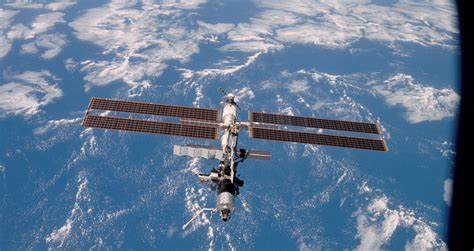(单词翻译:单击)
听力文本
Space University Program Prepares Scientists to Battle Health Crises
This week the International Space University, based in Strasbourg, France, ended its first virtual Interactive Space Program, or ISP.
The ISP is an online development program for scientists in different fields of expertise. It trains them to work together in groups, using space resources, to prepare for space flight and related projects.
The ISP is structured to be like a real space mission. About a month before the five-week program began, the groups received training on team dynamics and communication skills. They also learned how to use digital tools for sharing documents, team-building and social exchanges.
Eighty-six men and women, representing 30 different nationalities, took part in the latest Interactive Space Program, called ISP 2020. The participants learned about all areas of study linked to space exploration. Like members of an actual space flight crew, they worked closely with space experts during the program.
The director of the ISP 2020, Karacallu, spoke with VOA about the participants.
"So, ISU in general, not particularly this program, operates on a more almost intergenerational setting so we have participants starting from new graduates at the age of 20, 21. And we have participants, even in this program, at the age of 60 plus who are senior managers in their institutions or organizations.
And generally, the average age is around 35. I can definitely say the network that we have at ISU, especially through our alumni -- and we have alumni [from] around 110 countries, at the moment, represented -- that network is actually one of the driving factors for people to ISU programs."
This year 12 of the participants came from India, which has a growing space program. Four of the 12 were awarded a scholarship honoring the Indian American astronaut Kalpana Chawla. She was the first Indian-born woman in space. She was one of the seven astronauts killed when the U.S. space shuttle Columbia broke up when reentering Earth's atmosphere on February 1, 2003.
Just like real astronauts, the participants were asked to complete a simulated space mission.

Karacallu explains: "The topic of this year, this particular program, is how space -- space technology, space assets in general -- can help the current and the next future pandemics, to solve the situation."
On many days, the program began with a talk by an expert from a space agency official or representative.
Alumni of the program talked to the participants at other times. One of its most famous alumni is American Jessica Meir. She spoke with the participants this summer about her work with NASA, the U.S. space agency. Meir was part of the first all-female spacewalk in history.
The interactive training also involved practical aspects of space and health crises, including pandemics. The participants were given a chance to use satellite and communications technology. Other areas of study were artificial intelligence and medical fields. Speakers talked about business, international cooperation and other issues.
These talks were followed by individual and teamwork activities. ISP participants worked in teams with members in different time zones. They studied space and health issues related to pandemics.
Karacallu said the teams closely examined four areas.
"One is how to monitor pandemics from space, the second one is how to mitigate for a future event, how to prevent and how to be prepared. So actually we have these four different teams, each team actually going much more into depth in each of these areas."
As part of the ISP 2020 experience, the participants were required to perform activities not directly related to space exploration. They had to grow food, cook something, get physical exercise -- such as walking a certain distance -- and plant a tree. Working with speakers of other languages made them communicate better in English. Working across time zones made them understand how astronauts feel as they circle the planet during a typical workday.
At the end of the program, each team produced a report and made a presentation on how space can help fight pandemics. The university says the presentations were given to representatives of the World Health Organization and decision-makers from around the world.
I'm Jill Robbins.
重点解析
重点讲解:
1. based in 位于;总部;
Both firms are based in Kent.
两个公司的总部都设在肯特市。
2. in general 通常;一般来说;
I disagree with drug laws in general.
总的来说,我反对药品法。
3. related to 与……有关系;与……相关;
Light industry is closely related to agriculture.
轻工业和农业密切相关。
4. such as 例如;象……这样;
There are also unpleasant brain effects such as anxiety and neurotic behaviour.
也会对大脑产生不良影响,如焦虑和神经质的行为。
参考译文
太空大学项目为科学家应对健康危机做好准备
本周,位于法国斯特拉斯堡的国际空间大学结束了其第一个虚拟交互空间项目(ISP)。
ISP是一个针对不同专业领域科学家的在线开发项目,训练他们利用太空资源,分组合作,为太空飞行和相关项目做准备。
ISP的体系就像一个真正的太空任务。在这个为期五周的项目开始前一个月,这些小组接受有关团队动力和沟通技巧的培训,还学习如何使用数字工具共享文档、进行团队建设和社交交流。
来自30个不同国家的86名男女,参加了名为ISP2020的最新交互式太空项目。参与者了解与空间探索有关的所有研究领域。他们就像是真正的太空飞行机组成员一样,在项目进行期间与太空专家密切合作。
ISP2020负责人卡拉卡卢接受美国之音采访时,谈到了参与者的情况。
“一般来说,ISU,尤其是这个项目,是在一个更接近代际的环境下运作的。所以,参与者中有20岁到21岁的新毕业生,还有60多岁的人,甚至在这个项目中也有。他们都是所在机构或组织的高级管理人员。
一般来说,参与者平均年龄在35岁左右。我可以肯定地说,我们在ISU项目中拥有的网络,特别是通过我们的校友(目前,我们有大约来自110个国家的校友),该网络实际上是人们参加ISU项目的驱动因素之一。”
今年,有12名参与者来自印度。印度的太空计划正在不断发展。在这12人中,有4人获得了表彰印度裔美国宇航员卡尔帕娜·查拉的奖学金。她是第一位到达太空的,出生于印度的女性。2003年2月1日,美国哥伦比亚号航天飞机重返地球大气层时解体,她是7名遇难的宇航员之一。
像真正的宇航员一样,参与者需要完成模拟太空任务。
卡拉卡卢解释说:“今年这个特别项目的主题是,太空——空间技术,总体来说是太空资产,如何帮助解决当前和未来出现的大型流行病。”
在许多日子里,该计划始于航天局官员或代表的专家演讲。
该项目的校友在其他时间与参与者交谈,最著名的校友之一是美国人杰西卡·梅尔。今年夏天,她与参与者谈到她与美国宇航局(NASA)的合作。梅尔曾参与历史上第一次全部由女性进行的太空行走项目。
互动培训还涉及包括流行病在内的空间和卫生危机的实际方面,参加者有机会使用卫星和通讯技术。其他研究领域包括人工智能和医学领域。发言人谈到商业、国际合作和其他事宜。
会谈之后是个人和团队活动。ISP参与者以小组方式,同位于不同时区的成员工作。他们研究与流行病有关的空间和健康问题。
卡拉卡卢说,小组仔细考察了四个方面。
“第一个问题是,如何从太空监测传染病;第二个是如何减轻对未来事件的影响,如何预防并做好准备。因此,实际上我们有这四个不同的小组,每个组实际上针对各个领域进行深入研究。”
作为ISP 2020经历的一部分,参加者必须从事与空间探索没有直接关系的活动。他们需要种粮食、做饭、做运动,比如走一段距离,还要种一棵树。与讲其他语言的人一起工作,使他们能更好地用英语交流。跨时区工作,让他们了解到宇航员在典型的工作日环绕地球时的感受。
项目结束时,各小组都编写一份报告,并阐述太空如何帮助抗击流行病。该大学表示,这些报告提交给世界卫生组织的代表和来自世界各地的决策者。
吉尔·罗宾斯报道。
译文为可可英语翻译,未经授权请勿转载!


